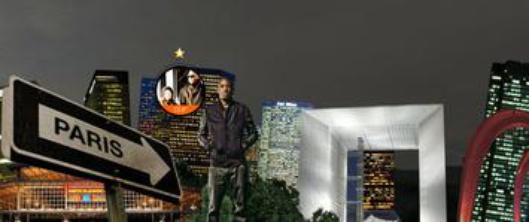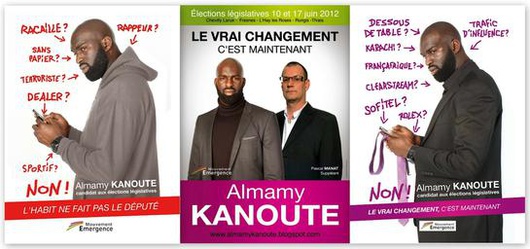Rappers, politics and Paris
Published on
The image of the French suburbs or ‘banlieues’ is still bound up with images from the 2005 riots.
The association, which won votes from famous French rappers in a campaign during the May 2012 French presidential elections, is tackling political apathy among young people in the banlieues, says ( Translation: )
 ACLEFEUChristiane
LötschSarah
Hole
ACLEFEUChristiane
LötschSarah
Hole
Abd al Malik (Image: © abdalmalik.fr)
‘Your vote is a weapon. Unload the ammo into the ballot box,’ says the presenter, Nima, as he looks into the camera with a dispassionate expression. He is one of the French celebrities to have followed the call of the ACLEFEU (‘assez le feu’ – ‘put the fire out!’) association and released a video message for young people in the suburbs or ‘banlieue’ all over France. Their slogan is ‘I’m voting for a type of politics I’ve chosen, not one inflicted on me’ (‘Je vote pour une politique choisie et non subie’).
Wealth of imagination
Mohamed Mechmache, who started the campaign, speaks quickly. It’s easy to imagine how he persuaded the artists to share his enthusiasm. ‘The 2012 presidential elections were decisive for the future of our society. They should not take place without votes from the banlieues. Young people in Clichy-sous-Bois (in the eastern suburbs of Paris - ed) feel they have been long forgotten by politicians and completely unrepresented. The question most frequently asked by young people is why they should vote at all.’ The trust young people need - credibility - is something they’ve found in artists, rappers, actors or musicians who can be a mouthpiece for them through their lyrics. Actor Jamel Debbouze, rappers La Fouine, Black Barbie, Jean-Claude Tchicaya or Kamel Le Magicien, slammers Grand Corps Malade, Kamelancien, Wahid and François Durpaire support this cause through their appearances in the aclefeu video clip.
Samba Doucoure, a 24-year-old journalist, collects all the information he can find on French rap on his personal page of the interactive magazine about the banlieues, streetpress.com. His is clearly distinguished by his big white headphones and a bag carrying two loudspeaker boxes. He likes French rap because it’s so varied – the themes may or may not have a political element, the language can be direct or poetic, and it can sound African, classical or even rock. ‘There’s such a wealth of imagination behind the music!’ raves the small, introverted man in the Jardin de Luxembourg. French audiences aren’t yet aware of this variety. Right at the start of the meeting, I admit that the only French rappers I only know are MC Solaar and IAM. Samba laughs. ‘You’re not the only one. Most French people actually only know these two rappers, maybe NTM as well. They were very mediatised in the 1990s but they also paved the way for the rap that came to France from the United States.’
Mafia K’1Fry in Paris’ luxury districts
Once, young people from the French middle class were putting up up posters of MC Solaar and IAM on their bedroom walls. Now it seems that most French people and rap have drifted apart, which is particularly due to continuing segregation in French society, says Samba. The drab banlieues are in one area, and Paris’ luxury districts in another, where the residents wouldn’t have a clue who Oxmo Puccino, Mafia K’1Fry or Médine are. Instead, people latch on to the image of criminal, drug dealing, rapping gangsters, who must be ‘cleaned out with a Kärcher’ from the ‘cités’ or banlieues, as former president Nicolas Sarkozy claimed in the 2006 election campaign.
Rapper Abd al Malik was selected to receive the ‘order of the arts and letters’ in 2008 because he was viewed as a ‘prominent representative of hip hop culture, who supports purposeful and fraternal rap’, according to the then-culture minister Christine Albanel. Assimilation is the magic word. A rapping gangster-cum-assimilated artist who calls for unity of the French nation meets with public approval. However, nobody wants to hear fake election promises. Yet Samba’s alleged involvement in politics may also just be a cheap marketing trick to draw attention to his new record. When politics and art mix too much, there’s the danger that artists can be viewed as representatives of ‘their’ banlieue, their lyrics taken at face value, and artistic freedom ignored.
Rap for civil society
Almamy Kanouté, who makes a guest appearance in the aclefeu video clip, meets me at the station in Antony, a district in the south of Paris. He’s busy greeting every young person hanging out in front of the station by name and with a handshake as he asks after their families. Almamy is a youth worker who believes that rap can encourage young people to engage with politics. ‘Just as a loudspeaker reaches many people at once, artists express complex issues in a much clearer and simpler way.’
 Almamy Kanouté | Candidate 2012
Almamy Kanouté | Candidate 2012
Almamy adds that knowing about politics should not be optional for young people. As long as young people feel they can have an impact on their political environment, there’s no danger that they’ll find extremist parties appealing. He says that he returned a spoilt ballot paper at the presidential elections because there weren’t actually any good candidates. ‘It’s just stupid to persuade young people that they should find out about all the candidates, only to discover that none of the candidates really represent their concerns,’ he says. Then again, it’s precisely this situation that can also lead rappers like Zoxea to become increasingly involved in politics. ‘We haven’t had any real politicians in power for thirty years,’ he explains via email. ‘That’s why, at each election, I use my music to draw closer to the candidates who represent us the best. A rapper can pass on his message to young people much more easily in his music – and music makes everything a lot simpler and better, doesn’t it?’
 In partnership with the
Paris-based Franco-German office for journalists (Ofaj), this
article is a part of Orient
Express Tripled, cafebabel.com’s ‘return journey’ series of
articles with journalists resident in the Balkans, Turkey, France and Germany
In partnership with the
Paris-based Franco-German office for journalists (Ofaj), this
article is a part of Orient
Express Tripled, cafebabel.com’s ‘return journey’ series of
articles with journalists resident in the Balkans, Turkey, France and Germany



